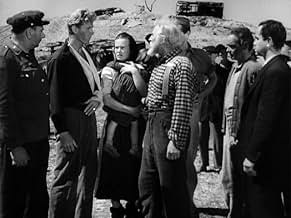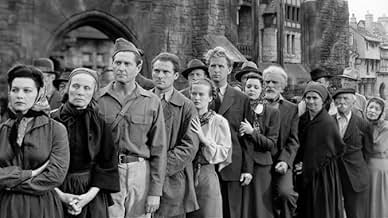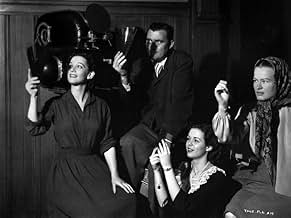In the dying days of World War II a German agent infiltrates a recently liberated Belgian town. His aim is to turn them against their Allied liberators.In the dying days of World War II a German agent infiltrates a recently liberated Belgian town. His aim is to turn them against their Allied liberators.In the dying days of World War II a German agent infiltrates a recently liberated Belgian town. His aim is to turn them against their Allied liberators.
- Awards
- 1 win total
Helen Beverley
- Mrs. Martha Varin
- (as Helen Beverly)
Richard Aherne
- Sergeant Patrick O'Farrell
- (as Richard Nugent)
Ludwig Donath
- Schmidt
- (as Louis Donath)
Gigi Perreau
- Baby
- (as Ghislaine Perreau)
Axel Anderson
- Nazi Officer
- (uncredited)
George Blagoi
- Nazi Officer
- (uncredited)
Sammy Blum
- Alex
- (uncredited)
Featured reviews
George Coulouris is nazi Colonel von Beck, near the end of WW II. as a high official, he is sent off to hide in Belgium, hopefully to re-ignite the nazi mission again, by turning the liberated town folk against the americans, and each other. it's even more interesting that this was made in 1944, while the war was still going on! co-stars thirty year old Lloyd Bridges, as Frank Bartoc, and Nancy Gates as Nina. Pretty good film! von Beck tries to stir up mistrust, some of the locals seem to go along with him. some religion. talk of hope. rebuilding. allegiance. faith in beliefs and trust. One of only five films directed by Biberman. he was caught up in the House Un-american Activities Committee actions, in the 1940s. he, his wife Gale Sondergaard, and many others were blocked from working in hollywood, as they refused to testify before the committee. This one is pretty good... could have been great, but I think because the war was still going on, a lot of it is "propaganda" acting, to give hope to those back home, and to prove to the audience that we were on the side of right.
The story is about a group of Nazis who try to blend in the with locals in the waning days of the war. One in particular, Colonel Von Beck (George Coulouris) is the star of the film...and his methods seem bent on sowing discontent and chaos. Can the Allies figure out who this man is before it's too late?
According to IMDB, this film was rushed through production in order to capitalize on the recent Allied invasion of France. And, while I watched, the film did have a hurried feel to it. It wasn't due to the acting or music or cinematography but the story itself...a story that seemed like it needed a re-write as some of it was a bit rough. Some examples of how heavy-handed and shallow some of the scenes were would be the incredibly over-idealized Russian doctor as well as the church scene. In addition the film uses one of the worst cliches in film history...a person telling the evil person that they are going to turn them in to the authorities! You just KNOW what's gonna happen to this woman!
By the way, despite me not enjoying the story, George Coulouris was wonderful as the Nazi agent...and he was always excellent in playing awful characters.
According to IMDB, this film was rushed through production in order to capitalize on the recent Allied invasion of France. And, while I watched, the film did have a hurried feel to it. It wasn't due to the acting or music or cinematography but the story itself...a story that seemed like it needed a re-write as some of it was a bit rough. Some examples of how heavy-handed and shallow some of the scenes were would be the incredibly over-idealized Russian doctor as well as the church scene. In addition the film uses one of the worst cliches in film history...a person telling the evil person that they are going to turn them in to the authorities! You just KNOW what's gonna happen to this woman!
By the way, despite me not enjoying the story, George Coulouris was wonderful as the Nazi agent...and he was always excellent in playing awful characters.
Herbert Biberman (1900-1971) is the writer and director of this 1944 film. Biberman was a member of the left wing theatre group in New York City and was married to Gale Sondergaard. Both Biberman and Sondergaard were victims of the HUAC "red scare" – Biberman served time in prison and both were blacklisted.
This was his third film as director, fifth as a writer.
Lloyd Bridges (1913-1998) has a minor role in the film. Bridges too was briefly blacklisted but turned around and would be a staunch right wing presence.
(Doc) Robert Golden produced the film. He also produced "Hitler's Children" (1943) which was directed by Edward Dmytryk, another director imprisoned during the HUAC trials. "Hitler's Children" was the most successful film for RKO, even surpassing King Kong, and led to this film being made.
From the film there aren't many obvious communist themes, but there is a sympathetic Russian soldier and there is a lot of emphasis on people working together. The film is ardently anti-Nazi.
George Coulouris (1903-1989) gives the best performance of his career. Osa Massen (1914-2006) is excellent.
This was his third film as director, fifth as a writer.
Lloyd Bridges (1913-1998) has a minor role in the film. Bridges too was briefly blacklisted but turned around and would be a staunch right wing presence.
(Doc) Robert Golden produced the film. He also produced "Hitler's Children" (1943) which was directed by Edward Dmytryk, another director imprisoned during the HUAC trials. "Hitler's Children" was the most successful film for RKO, even surpassing King Kong, and led to this film being made.
From the film there aren't many obvious communist themes, but there is a sympathetic Russian soldier and there is a lot of emphasis on people working together. The film is ardently anti-Nazi.
George Coulouris (1903-1989) gives the best performance of his career. Osa Massen (1914-2006) is excellent.
Director Biberman is remembered today, if at all, for being one of The Hollywood Ten – film people who defied the House Un-American Activities Committee (HUAC) and ended up in prison: consequently, his career numbered very few films – two ‘B’ thrillers made previous to this and two more (albeit higher-profile) titles after it; I myself had watched the best-regarded of the lot, SALT OF THE EARTH (1954), some time ago.
The two films clearly state where his political sympathies lie – given their celebration of collectivism during periods of turmoil (in the case of THE MASTER RACE, it obviously deals with WWII and, specifically, the ferreting of Nazi criminals and local collaborationists in Belgium once the Allies turn up to liberate the country). Unsurprisingly, all of this gives way to a lot of speechifying – though the war elements render the whole more palatable than was the case with SALT OF THE EARTH (which concerned a prolonged strike at a New Mexico mine-field); the narrative, in fact, throws in everything but the kitchen sink (with plenty of twists and turns along the way) – and, while the characters may come across as stereotypes at times, solidly professional production values (the film was made by RKO at its prime) carry it through.
The cast is modest yet effective – principally George Coulouris in one of his best roles as the Nazi Colonel (the film starts off with him disbanding his chain of command when it becomes clear that the Germans were losing the war) who passes himself off as the patriotic brother of a traitor who has been executed (in this respect, it’s the Hollywood equivalent of Britain’s WENT THE DAY WELL? [1942]). The latter’s surviving wife and daughter are having a hard time coping with this fact, being themselves under a cloud of suspicion – and the German is thus able to observe both sides with relative ease (since he obviously now professes to denounce Nazism, while at the same time rousing gullible locals into resisting the Allies’ help by making them out to be just another group of tyrants!). The more prominent among the ranks of the latter are Stanley Ridges as the American Major in command of the country’s reconstruction and Carl Esmond as a rugged but cheerful Russian officer with medical experience.
One other important female character is that played by Osa Massen, a local girl who succumbed to the advances of a German officer – a relationship which has even produced a child – while her fiancé and brother (Lloyd Bridges, himself in love with the niece of the man Coulouris has replaced!) went to war. There’s much conflict and heartache at the core of such sensitive issues – but understanding, forgiveness and hope for the future eventually prevail. Incidentally, we also get a repentant Nazi (now being held in the same concentration camp where the Belgians had been incarcerated not long before) and it is he who brings about Coulouris’ downfall; the latter had already committed murder and also ordered the destruction of the prison, ostensibly as an act of retribution against the Nazis but really to blame the locals for it – thus causing discord between them and the Allies! The film remains interesting today for its uncompromising and intimate look at the ravages of war, made with relatively few concessions to Hollywood conventions – displaying instead courage, conviction and a passion rarely felt in this type of genre offering.
The two films clearly state where his political sympathies lie – given their celebration of collectivism during periods of turmoil (in the case of THE MASTER RACE, it obviously deals with WWII and, specifically, the ferreting of Nazi criminals and local collaborationists in Belgium once the Allies turn up to liberate the country). Unsurprisingly, all of this gives way to a lot of speechifying – though the war elements render the whole more palatable than was the case with SALT OF THE EARTH (which concerned a prolonged strike at a New Mexico mine-field); the narrative, in fact, throws in everything but the kitchen sink (with plenty of twists and turns along the way) – and, while the characters may come across as stereotypes at times, solidly professional production values (the film was made by RKO at its prime) carry it through.
The cast is modest yet effective – principally George Coulouris in one of his best roles as the Nazi Colonel (the film starts off with him disbanding his chain of command when it becomes clear that the Germans were losing the war) who passes himself off as the patriotic brother of a traitor who has been executed (in this respect, it’s the Hollywood equivalent of Britain’s WENT THE DAY WELL? [1942]). The latter’s surviving wife and daughter are having a hard time coping with this fact, being themselves under a cloud of suspicion – and the German is thus able to observe both sides with relative ease (since he obviously now professes to denounce Nazism, while at the same time rousing gullible locals into resisting the Allies’ help by making them out to be just another group of tyrants!). The more prominent among the ranks of the latter are Stanley Ridges as the American Major in command of the country’s reconstruction and Carl Esmond as a rugged but cheerful Russian officer with medical experience.
One other important female character is that played by Osa Massen, a local girl who succumbed to the advances of a German officer – a relationship which has even produced a child – while her fiancé and brother (Lloyd Bridges, himself in love with the niece of the man Coulouris has replaced!) went to war. There’s much conflict and heartache at the core of such sensitive issues – but understanding, forgiveness and hope for the future eventually prevail. Incidentally, we also get a repentant Nazi (now being held in the same concentration camp where the Belgians had been incarcerated not long before) and it is he who brings about Coulouris’ downfall; the latter had already committed murder and also ordered the destruction of the prison, ostensibly as an act of retribution against the Nazis but really to blame the locals for it – thus causing discord between them and the Allies! The film remains interesting today for its uncompromising and intimate look at the ravages of war, made with relatively few concessions to Hollywood conventions – displaying instead courage, conviction and a passion rarely felt in this type of genre offering.
Set in the near future following Germany's surrender - which probably qualifies it as science fiction - 'The Master Race' was made when being anti-Nazi wasn't yet deemed to be unAmerican and it was still believed that former Nazis were just waiting their chance to stage a comeback.
Representing a key credit for director Herbert J. Biberman, later to be blacklisted as one of the Hollywood Ten - Philip Dorn's portrayal of a noble Russian probably didn't help - and hailing from the days when George Coulouris was playing Nazis in Hollywood, 'The Master Race' contains an early expression of the belief that later became a Marxist commonplace that social forces not individuals decided political outcomes and that Hitler was just the puppet of vested financial interests; made overt by the opening scene when Coulouris glances at a portrait of his erstwhile Fuhrer and says "In defeat he has no value. They can have him...!"
Representing a key credit for director Herbert J. Biberman, later to be blacklisted as one of the Hollywood Ten - Philip Dorn's portrayal of a noble Russian probably didn't help - and hailing from the days when George Coulouris was playing Nazis in Hollywood, 'The Master Race' contains an early expression of the belief that later became a Marxist commonplace that social forces not individuals decided political outcomes and that Hitler was just the puppet of vested financial interests; made overt by the opening scene when Coulouris glances at a portrait of his erstwhile Fuhrer and says "In defeat he has no value. They can have him...!"
Did you know
- Trivia"Lux Radio Theater" broadcast a 60 minute radio adaptation of the movie on Januray 15, 1945 with George Coulouris and Helen Beverley reprising their film roles.
- GoofsThe British officer Captain William Forsythe gives a palm down American style salute.
- Quotes
Senior Lt. Andrei Krestov: I'm a doctor. or I was. and I can play the mouth fork.
Major Phil Carson: I was afraid of that.
- ConnectionsFeatured in Hollywood the Golden Years: The RKO Story: Dark Victory (1987)
Details
- Runtime
- 1h 35m(95 min)
- Color
- Aspect ratio
- 1.37 : 1
Contribute to this page
Suggest an edit or add missing content

































